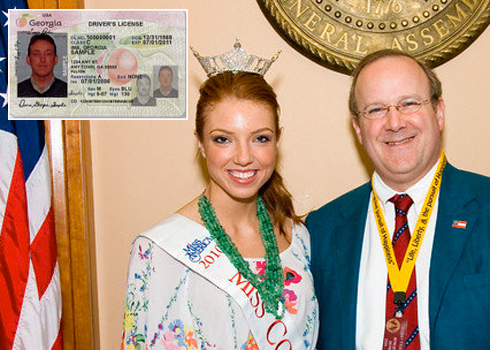Republican Georgia state legislator Bobby Franklin thinks that driver’s licenses impose undue restrictions on the right of citizens to travel. So he’s proposed legislation to stop the state from issuing them.
“Free people have a common law and constitutional right to travel on the roads and highways that are provided by their government for that purpose,” Franklin’s legislation states. “Licensing of drivers cannot be required of free people, because taking on the restrictions of a license requires the surrender of an inalienable right.”
In an interview with CBS Atlanta News, Franklin claimed driver’s licenses are a throw back to oppressive times.
“Agents of the state demanding your papers,” he said. “We’re getting that way here.”
He said there wasn’t a reason for people to need to know who was whom on the roads, and that there’s nothing in place to stop children from driving anyways.
Notably, Georgia has a law which requires residents to show photo identification when voting in person — a law cleared by the Civil Rights Division during the Bush administration, reportedly against the recommendation of most of the career staff of the Voting Section.
That’s not the only eyebrow raising legislation Franklin has introduced: he’s also proposed bills requiring the exclusive use of gold and silver as tender in payment of debts by or to the state; a bill seeking to eliminate crop management regulations; another bill banning forced vaccinations; a bill to stop the collection of the Georgia income tax; another to stop all property taxes and yet another to end eminent domain.
He has also sought to abolish the State Road and Tollway Authority, the Department of Health and Human Services and any social services Georgia provides.
In one bill that reads as his philosophical statement on the roots of government, Franklin laments the fall of religious and family authority. The bill — called the “Life, Liberty, and Property Restoration Act” — begins by acknowledging the existence of “an almighty, everlasting, creator God, the God of the Bible, the only God there is.” The bill then notes that God created “four, not one spheres of government”: self-government, family government, church government, and finally “the fourth, and least” — civil government.
Using an example from the Bible, Franklin’s legislation goes on to lament how the civil government has usurped the powers of the other three. In order to rectify this imbalance, Franklin proposed in the same bill that a six person legal repeals committee, comprised exclusively of members that have never received a law degree. “None of the members shall have graduated from a law school accredited by the American Bar Association or have ever been admitted to the practice of law in any state.”
The committee would highlight all laws that were enacted and “fail to comply with the foundational principles of civil government articulated in the unanimous Declaration of the thirteen United States of America.”
Franklin also proposed a “Freedom of Choice and Security Act,” guaranteeing the right of all people to potentially inflict violence on others. “The mere potential to deprive someone of life, liberty, or property should never be considered a crime in a free and just society,” the bill read.
Franklin has often been concerned about protecting gun rights. He has suggested amending Georgia law to remove Georgia’s governor’s power to suspend gun and firearm sales in emergency situations, and another bill would make it legal to carry firearms into houses of worship.
His sights have extended to the Georgia’s courts as well. Franklin proposed a bill that would make appellate decisions binding only for the parties immediately involved, instead of being binding for other similar but unrelated cases. Instead of having courts determine the constitutionality of laws passed, Franklin proposes a bill “to provide that any citizen of this state shall have standing to bring an action to challenge the constitutionality of any law enacted by the Georgia General Assembly.”
Additional reporting by Alex Sciuto.







So does he think that the states can require that.vehicles be road worthy?
So what would he do about unsafe drivers?